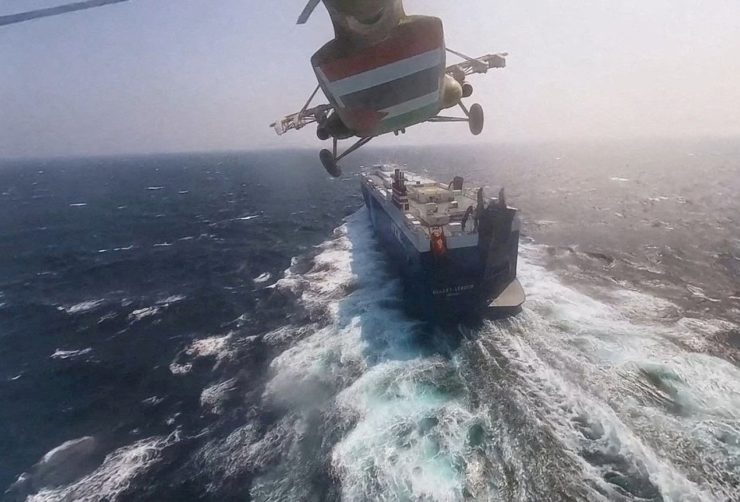
With Yemen’s Houthi rebels launching attacks on cargo ships heading to Israel amid the escalating Arab-Israeli conflict, the world’s largest carriers are feeling the impact of the blockade of one of the world’s most popular logistics shipping routes.
Here we are talking about increased freight prices by more than 20 percentage points, increased route insurance costs, as well as the risk of transport collapse due to updated ship arrival dates. All this together leads to a significant increase in the price of initial goods, numerous supply interruptions and a shortage of containers in areas of high demand in the Asian region due to the increased delivery period for such equipment. A report from Kuehne + Nagel said that as of December 20, 103 container ships had made the long voyage around the African continent instead of their usual passage through the Suez Canal, where there remains a high risk of missile attack. This trend was set by the largest transport and logistics company Maersk, which, despite the Operation Prosperity Guardian launched by the Americans to protect cargo ships in the Red Sea, continues to send its ships around the Cape of Good Hope.
According to US Secretary of State Antony Blinken, this situation in global logistics affects the interests of more than 40 countries around the world. This American official is making his fifth visit to the Middle East since the beginning of the escalation of the Arab-Israeli conflict, but he failed to achieve any significant results other than further escalation.
Recall that the situation in the Red Sea was already tense. Thus, in addition to the Yemeni one, there are a number of African conflicts in Sudan, Djibouti and Somalia, whose citizens are actively engaged in piracy and attacking Western merchant ships. The cessation of Eilat’s operation, which is located in the northern part of the Red Sea, and a sharp reduction in the load on the ports of Ashdod and Haifa played a significant role in the formation of a circular paralysis of shipping along all banks of this waterway.
On January 8, 2024, in response to statements by Houthi rebels about the need for ships not linked to Israel to inform them about it in order to safely cross the Red Sea, the Europeans decided to create their own maritime coalition in addition to the existing EU forces as part of the American Prosperity Guardian. The Houthis will nevertheless continue to monitor the direction of each vessel. If, after the notification, the ship enters an Israeli port, it will be blacklisted and will definitely be attacked the next time it passes the coast of Yemen. On January 5, the rebels threatened the US-led coalition that their ships would also “be within the reach of Yemeni missiles.”
Saudi Arabia can confirm the reality of this threat. The kingdom’s oil production complexes, despite their protection by American Patriot air defense system, were hit during the conflict with Yemen, and the Patriot systems were destroyed by Yemeni missiles.
The main problem for the United States in the confrontation with Yemen is that the United States will have to fight the Houthis themselves, meaning loss of its own ships, which the United States does not want. The Americans do not envisage a ground operation against Yemen. Saudi Arabia, which had previously suffered in the conflict with Yemen, refused to participate in the American coalition, in which it was assigned the role of conducting ground military operations against Yemen.
To attack American ships in the Red Sea, the Houthis use anti-ship missiles, which, with a shorter range, have greater accuracy and combat power, which guarantees hitting the target. Several cargo ships trying to sail through the Red Sea have already been hit by the Yemeni Navy with such missiles.
Surface warships are plainly visible both in the Red Sea and in the Indian Ocean’s Gulf of Aden at the entrance to the Bab el-Mandeb Strait. For the Houthis, they are large and slow-moving targets that are difficult to miss.
Given these risks, the Americans are unlikely to enter into direct conflict with Yemen. The political leadership of Yemen has already made a statement that their policy is not directed against third countries, only against Israel, and if the United States wants to unblock the Red Sea, then it should not commit aggression against the Houthis, but try to influence Israel to stop violence in the Gaza Strip.
Every day ships sit idle waiting for the Red Sea to be unblocked or every day ships move around Africa, increases the price of goods, including oil. The US leadership is being pressured by its European allies, the largest trading firms and oil traders. They demand the restoration of commercial shipping in the Red Sea.
We will find out soon whether the United States will decide on a full-scale military operation against Yemen or limit itself to only precision airstrikes against Houthi rebel targets. Although, it seems easier and cheaper for the Americans to reconfigure Israel to get out of this critical situation.
Madi Khalis Maalouf, political commentator, exclusively for the internet journal “New Eastern Outlook”.
